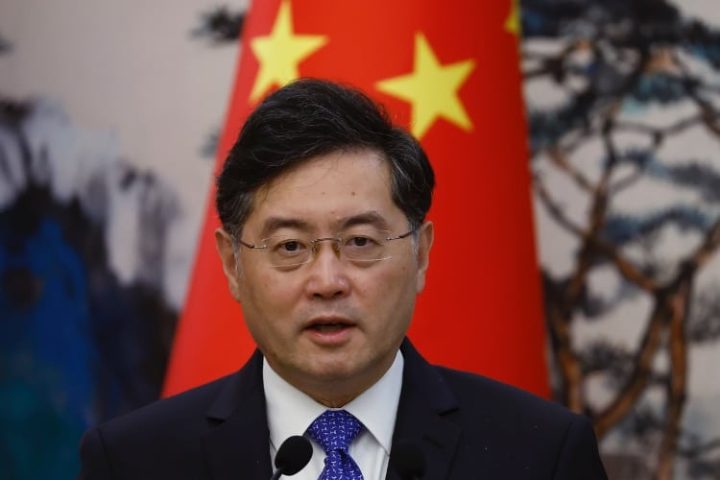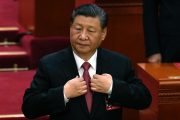
On June 14, Chinese Foreign Minister Qin Gang spoke over the phone to U.S. Secretary of State Antony Blinken, urging Washington to cease meddling in China’s domestic matters and undermining Chinese interests.
“The American side must show respect, stop interfering in China’s internal affairs, stop damaging China’s sovereignty, security and development interests for the sake of competition,” Chinese media cited the foreign minister as saying.
Qin also said he hoped that the US would advocate for exchanges and collaboration to stop bilateral ties from worsening.
During his talks with Blinken, the Chinese foreign minister singled out Beijing’s stance regarding Taiwan and other important matters, Sputnik News reported.
Previously this month, Sputnik News reported that the United States may be deploying four MQ-9B Sea Guardian drones to Taiwan, permitting the self-governed island to share real-time surveillance data with Tokyo and Washington. In light of recent developments, retired U.S. Army Lieutenant Colonel Earl Rasmussen shared his analyses with Sputnik News.
“I think it’s pretty significant as far as reconnaissance capabilities,” Rasmussen declared. “Essentially we’re lining the entire east coast of China with reconnaissance, unmanned reconnaissance capabilities. Their range is over a thousand miles. So they can interlink fairly well depending on how many are actually in flight at the same time. But they’ve got eight in Japan, which just got delivered last November. So they’re relatively new in Japan, probably ordered within the last two to four years. Then recently also you’ve got a partnership between a [South] Korean manufacturer of drones and General Atomics [who] signed a cooperation agreement. Whatever is happening in Korea, you’re going to see some interoperability or joint capabilities or perhaps, potential a Reaper presence, a more drone presence in Korea. And then you’ve got these four here.”
The MQ-9B Sea Guardian is a remotely operated aircraft system (RPAS) that is configurable for maritime surveillance, intelligence, and reconnaissance (ISR) missions, as well as anti-surface warfare, anti-submarine warfare, and airborne mine countermeasures.
Notably, the remotely run aircraft can fly for more than 30 hours (based on the configuration), thus allowing joint forces to provide real-time situational awareness anywhere and anytime, according to the manufacturer.
“The discussions to sell them [to Taiwan] took place for minor things in 2020,” Rasmussen added. “So now we’re just getting some confirmation on the finalization of the sale and the interoperability that’s going to be in place. So that’s the key thing. These all are going to be interoperable, they’re sharing data and real time information.”
Based on some media reports, the aforesaid MQ-9B UAVs would operate together with Taiwan’s fleet of Lockheed P-3C Orion anti-submarine and maritime surveillance aircraft, which have allegedly been utilized for surveillance missions in the disputed South China Sea since at least 2015, The Diplomat has claimed.
Rasmussen further posited that it seems as if America is establishing a type of unmanned aircraft network in the Asia-Pacific region, alluding to America’s mobilization of lethal drones to the Philippines for joint military exercises in late April this year. During the yearly Balikatan exercise, a pair of MQ-9 Reapers participated in intelligence, reconnaissance, and surveillance missions.
“So now think of the whole geographical thing from Japan, [South] Korea, stretching South through Taiwan, to the Philippines,” the U.S. Army veteran stated. “Basically, they’re trying to put a presence or a surveillance capability. And we already sail our fleets, kind of questionably, through the freedom of sea movement which, by the way, [the United States is] not a party to the agreement in the UN, but [it] use[s] that to justify sailing [American] ships to the South China Sea. And now we’ve got the East China Sea that, I’m sure, will be involved.”
Rasmussen contended that America’s current military buildup in the Asia-Pacific region is a blatantly provocative action against China, particularly in light of Beijing’s view that Taiwan is a renegade Chinese province to be reunited with the mainland, by force if necessary. Adding salt to the wound has been NATO’s plan to set up a liaison office in Japan.
“This is about US containment of China,” Rasmussen highlighted. “It’s locking these countries into providing a US military presence with these countries, dependent on their technology as well. I’m sure there are other agreements that surround that. So, it’s not about the defense of them. Maybe you can say it’s about arms sales for our defense industry, but these are minuscule. They were talking about what? Four drones? They go for like four drones. I think you’re talking about $55-60 million. It is about 20 million per piece, probably a quantity discount. So it’s really not about that. It’s more about integrating in the US presence there and in this case enhancing the surveillance capabilities and I think targeting capability is necessary for the US.”
Similarly, Jeff J. Brown, author of The China Trilogy, editor at China Rising Radio Sinoland and co-founder and curator of the Bioweapon Truth Commission, divulged to Sputnik News:
The whole reason to put a NATO office in Japan is to create destabilization against Russia and China and to confirm South Korea’s and Japan’s total vassal role that they play with the United States using them like puppets to counter the Democratic People’s Republic of Korea (DPRK), Russia and China…. So the whole idea about doing this is just one more factor to destabilize Asia. For the United States, they get to destabilize three hated enemies. And those three hated enemies are China, Russia and the DPRK.
On May 10 of this year, Japanese Foreign Minister Yoshimasa Hayashi told CNN that Tokyo is in discussions to open a NATO liaison branch, the first of its kind in Asia. “We are already in discussions, but no details [have been] finalized yet,” the Japanese official confirmed.
Since the onset of the Russo-Ukrainian conflict in February 2022, Tokyo has been ramping up efforts to entrench ties with NATO, with Prime Minister Fumio Kishida becoming the first Japanese leader to participate in a NATO summit in June 2022. Besides, from April 24 to 26, 2023, Lieutenant General Francesco Diella helmed a military delegation from NATO’s Cooperative Security Division (CS) and visited Japan to meet senior Japanese military representatives and discuss possibilities to enhance military relations.



